- Home
- Anne Frasier
Stay Dead (Elise Sandburg series) Page 8
Stay Dead (Elise Sandburg series) Read online
Page 8
“Doesn’t anybody ever fill up before returning the car?” David pointed to the gas gauge. “I’ll bet if we check the log book we’ll see this was last driven by Mason and Avery.” David’s relationship with the other two detectives was better than it had been a year ago, but it was still rocky.
“Stop at Parker’s and I’ll put it on the department card,” Elise said. After all she’d been through, the thought of doing something as commonplace as pumping gas gave her a thrill. Yesterday she’d gone grocery shopping, and she’d actually enjoyed it. Her life was getting back to normal.
“I would never return a car with an empty tank, would you?” David asked.
Maybe she was trying too hard to prove she was physically on the mend, but as soon as David pulled up to the pump and cut the engine, she hobbled out and swiped the card.
Before she could grab the nozzle David was there, pumping the gas. “I mean, it’s like being married to those guys,” he said. “If the car isn’t on empty, it smells like some nasty fast-food place. Like greasy fries.”
He was wound up, like a kid on a sugar high. Sometimes she missed the David who kept himself level with prescription cocktails. What was she thinking? That wasn’t true. But this rattled David was hard to deal with. He just never shut up. Exhausting. But, come to think of it . . . “Are you on something?”
He blinked as if she’d flicked water in his face, and she instantly regretted her question. “Too much caffeine,” he said. “I swear to God they add a few extra shots of espresso just to mess with me. Look at my hand.” He held it out so she could see how he was trembling. Not that much, but noticeable.
She was going to apologize, but he moved on. That was one of the things she liked about David. He didn’t take offense easily. He just kept moving. Unlike her, he didn’t stop and stare and dwell.
“Do you think of Easy Rider whenever you put gas in the car?” he asked as the pump stopped pumping and the nozzle clicked. “Like right now?”
“What are you talking about?”
“The opening scene where Peter Fonda is putting gas in the motorcycle tank. And then he carefully removes the nozzle and wipes a drip. I always think of that. Always.”
“I think of The Birds. The gas station scene where the vehicles blow up.”
“Oh, that’s a good one.”
“If Mason and Avery had left the car with a full tank we wouldn’t be having this conversation,” she pointed out.
“True.”
Elise liked days like this, where she and David drove around the city, following one lead after another, interviewing person after person. In the past, there had always been an air of excitement to these events, an air of expectation. One clue. One small clue could crack a case wide open.
In between, they talked. Usually about the case, but not always. Because sometimes the eureka moment came when your mind was distracted, when you suddenly found yourself focusing on something else, usually something mundane. And then, out of the blue, pieces would start to fit together.
But of course now they were gathering information on Atticus Tremain. She tried to distance herself from the reality of the situation, but it was impossible. She also knew if she reacted in an unprofessional way, if she allowed her face to reflect what she was feeling, she’d get yanked from the case. Sure, David would much rather partner with her than work with Mason and Avery, but he also felt a level of responsibility. And she knew he’d been instructed to keep a close eye on her.
“What are you thinking now?” David asked, as he drove down Broughton looking for a place to park. “Still feel this is a copycat or someone who worked with Tremain?”
“I’m feeling copycat, but copycat killers are so rare. If it’s someone who worked with Tremain, then he didn’t learn the ropes. It’s all so sloppy. And Tremain is guilty. No doubt about that,” Elise said with conviction. But did it matter? The man was in a coma, and he would most likely never wake up.
She wanted him to wake up. She wanted him to stand trial. She wanted to see him get the death sentence. But if he went to trial, she’d have to take the stand. She’d have to sit in that courtroom and look at him. And she’d have to tell the jury what he’d done to her. Worse, she’d probably have to show the jury what he’d done to her.
David glanced at her. “You okay?”
“Are you going to ask me that every day?”
“As long as I keep seeing that haunted look on your face, yes. I’ll keep asking. And you’ll keep brushing me off.” He backed the car into a parallel parking spot, palm to the steering wheel as he looked over his shoulder. “And you know I’m no stranger to working while falling apart.”
“I’m not falling apart.”
“I didn’t say you were.”
“You did.”
“I just meant if you were I would know how you feel. That’s all.”
With lattes from Sentient Bean, they ate lunch in Forsyth Park, sitting on a bench under a live oak draped in Spanish moss, the clomp of carriage horses and the splash of a Parisian fountain as a sound track.
Elise had packed her own veggie sandwich made with tomatoes and avocados and sprouts, and David had picked up a slice of quiche from Parker’s Market. The weather was ideal. Kind of cool, but the sun was warm, and roses were blooming.
November was one of Elise’s favorite times of the year. Summer was too hot. Spring was sometimes too stormy, but November . . . yes, sometimes cold, but most of the time . . . glorious. She wasn’t a sun-worshipper. She didn’t go to the beach. She preferred to stay fully clothed and enjoy the feeling of the sun on her face. And really, she could never wear a swimming suit again. But right now she wanted to enjoy being back in Savannah.
Visitors often said the city was too dark. Too sad, too dirty, too secretive, too creepy, but those were all things Elise loved about it. No, it wasn’t all shiny and sunny and clean and bright like Hilton Head or Charleston. Being in Savannah was like landing on some alien planet where even the residents were visitors, living on the shoulders of a dark and brutal and beautiful past. The city felt organic. That’s what it was. The buildings almost felt like a part of the soil, a part of nature.
They threw away their trash, and Elise stuffed her insulated bag inside her purse. Without looking at David, she said, “We should go see him.”
He shot her a glance over the rim of his coffee cup. “Who?” But she could see he knew who, and he was hoping he was wrong.
“Tremain.” It wasn’t a strange thing to say. It made sense. “See if anybody has tried to visit him. See if there are any changes.”
“They said they’d call.”
“It’s good to stay on the hospital’s radar.” And it was good to check in and make sure everything was being done that was supposed to be done, including an armed guard. Especially the armed guard. “I know you don’t like hospitals,” she said.
“I’m getting better. I was okay the other day.”
True.
So they went.
“I think you should wait in the lobby,” David said once they’d parked the car and were heading up the sidewalk toward Memorial Hospital.
“Would you quit treating me like some weak victim? I’m a cop. No matter what happened, I’m a cop. Treat me like a cop. Can you do that?”
“Quit slamming the door in my face,” David said.
She was surprised by the hurt in his voice, but there was no damn way she was going to let him see her bleed. She wasn’t like him. And why did he insist on shining a light on her weaknesses? Uncovering them? The only way she could function was by stepping back, closing that door, forgetting about Elise the victim, and instead focusing on being Elise the detective. Couldn’t he see that? She needed to keep that door closed; otherwise, she might fall apart. Otherwise, she might not be able to continue.
Maybe someday she’d be able to talk about it, but no
t now. Now she had to be tough. Now she had to embrace her work persona, not her personal one. If David knew her the way he thought he knew her, he’d understand that. He wouldn’t keep bringing it up. The last thing she needed was group therapy and a warm hug. Hugs led to breakdowns. She didn’t want his soft eyes. She didn’t want his compassion. None of that helped.
“Okay,” he said quietly. “But you know I’m here for you. If you ever feel like talking. Day or night.” He gave her a level stare. And in that moment, she was aware of the beauty that was David Gould. Forget about the rambling man at the gas station. Forget about his previous drug issues. Forget about how he sometimes acted without thinking. She was looking at his core.
David wasn’t about being a tough cop. No, he was actually the opposite of that. He’d laugh if she said it aloud, but he was more about being a sensitive cop. He was like some spiritual guide who was able to connect with crooks and victims alike. He put up no walls. None.
“I need my walls,” she said. And even that admission made her feel weaker, made her feel shaky inside, and shaky outside, and she hoped he couldn’t see that shakiness, that weakness. But he did. She knew he did, but at least he pretended he didn’t. She needed that. She needed for him to pretend.
He pressed his lips together, and he nodded. As if he’d been there. And he had. And then he looked into her eyes, deep, deep, while they stood there on the sidewalk. While people walked past them, brushing their shoulders.
Would she live until Christmas? she wondered. What a strange thought. What an odd thought. She remembered how David had come to her house last Christmas and they’d played Frisbee in the park. He’d baked pumpkin bread, and it had been delicious. Those were the things life was made of. Not memories of torture, of humiliation.
Together, they turned and walked toward the hospital, their shadows long as the fading sun chased them inside.
Maybe it was just the idea of coming face-to-face with the man who’d held her prisoner. Maybe it was the idea of coming face-to-face with a monster. Maybe that’s why her head was in such a strange place, but she had to stay strong. And she had to see Tremain. She wanted to reassure herself that he was indeed harmless.
CHAPTER 15
Not that I’m in any way trying to minimize what this guy did to you, but he’s long gone,” David said, standing at the foot of Tremain’s bed, hands buried in the pockets of his coat. “We might as well be looking at a potato. Or a carrot.”
Elise wanted to believe him, but they’d both seen bodies that had been pronounced dead come back to life. And she’d read about people waking up from comas years later. “I wish we could just—” smother him.
David’s eyebrows lifted, and he nodded his head toward a pillow in a nearby chair, his meaning unvoiced but clear.
The cramped space was way too bright and blinding. Elise was tempted to pull out her sunglasses. “No.”
“I’ll do it.”
“I have no doubt of that, which is what worries me.”
They both fell silent, staring at the comatose man. Was he in there? Elise wondered.
Tremain was tall, probably six feet. Dark hair that would have touched his shoulders if he’d been upright. And so odd that a beard was beginning to appear. His face had been clean shaven when she’d last seen him.
Oxygen tubes in his nose, his chest rising and falling as his body took shallow breaths. IV bag on a rack, urine bag on the side of the bed. He was ten years older than Elise, but he looked at least sixty now, his skin gray and dehydrated. He looked like a corpse.
“I’ve seen a lot of dead bodies in my life,” David said. “You have too. And I’ve seen people die. I’m always struck by the absence, the nothing I sense once they are truly dead.”
“And you don’t feel anything in this room?”
“No.”
“Look at his eyes.”
“That’s typical of coma patients. That rapid eye movement.”
“And his fingers. One of them keeps twitching.”
“Touch him.”
She felt herself jerk. “What?” she said in disbelief.
“Like poking at something dead to reassure yourself nobody’s home. Or draw on his face with a Sharpie. I don’t know.”
Now that he’d brought up the touching . . . She stretched her hand toward him. In her mind, she imagined making contact, imagined his fingers wrapping around her wrist, his eyes flying open. None of that happened. There was no response as she dragged her fingers down his arm, as she touched the back of his hand. The only response was from Elise herself as she pulled in a trembling breath.
“See?” David said. “Carrot.” He grabbed the clipboard from the end of the bed and read the most recent report. Words like “persistent vegetative state” and “no change” were things she liked to hear.
“Let’s go.” He returned the clipboard to the hook.
But Elise couldn’t tear herself away. She couldn’t quit staring at the comatose man in the bed. Just a body. Just casing. But he felt every bit as alive, as present, as he had the days she’d spent with him.
She could feel him all over her. Touching her with his cold, smooth hands, breathing against her naked skin, his breath hot and poisonous. She could still feel and sense his unstable mind, a mind that had quickly washed her away. She could still feel the darkness in his head, his brain, a darkness that had pulled her under, smothered her.
She’d never understood how kidnap victims were so quickly brainwashed, so quickly overpowered. She’d thought they lacked fortitude. She’d thought them weak, with some kind of deficiency. But it was easy to succumb when locked in that world of madness. No food, no sleep. Just the room and the darkness of a sick mind. It was so easy.
If David hadn’t been in the room right now, she feared she would have put her face next to Tremain’s and inhaled his toxic scent, pulling him deep into her lungs. Repulsion intermingled with something she couldn’t understand. A weird and twisted kind of attraction. Fascination. Obsession. And while she was horrified by her response to seeing him again, she found herself thinking that this would make her a better cop. She now had a personal understanding of victim mentality and what might be considered an offshoot of Stockholm syndrome. Warring with that obsession was an overwhelming desire to see this person dead. To know he would never get up and walk out of this room. She wanted him to leave the hospital via the morgue. She wanted to see him lying on a slab downstairs, not in this bed. Only then would he get out of her brain.
She tried to be the logical Elise. She tried to tell herself that the ordeal had made her more emotional, more fragile. Maybe she had come back to work too soon. Yes, she was sure of it. But she couldn’t sit around doing nothing while a killer was still out there, whether he had a connection to Tremain or not.
“How long was I gone again?” she asked in a monotone voice.
“Three days and three nights.”
“That’s right.” How could she have forgotten? Especially with Dr. Kicklighter on her about it. “It seemed so much longer. It seemed like weeks. Months.”
“But not anymore, right? When you think about it? Does it still seem like weeks or months?”
She knew he wanted her to say no even though it would be a lie. She hadn’t thought about how it must have been for him, looking for her, thinking she was dead.
“How did you find me again?” She felt like a kid, needing to hear the same story over and over. How did you rescue me again, Daddy?
“You called me.”
“Oh, that’s right.”
David hadn’t saved her. She’d saved herself. On one rare occasion, Tremain had untied her hands, she wasn’t sure why. Maybe because they were blue. With her mouth gagged, with her hands numb, she’d managed to fight him, but he stomped on her ankle and she’d collapsed. Once she was down, he kicked her in the ribs and stomach. A knife appeared, the one he
’d used to cut the ropes from her wrists, and when he stabbed her she didn’t feel it. She remembered that part. Knowing she’d been stabbed but unable to feel any pain.
She grabbed his boot with hands so numb they felt like stubs, and she tugged. He flew backward, his skull cracking against the floor, his body sprawled in the bedroom doorway. She struggled to her feet and slammed the door against his head. How many times, she wasn’t sure.
They didn’t know which blow caused the most damage, the fall or the door. Probably the door. She dragged an unconscious Tremain into the closet where he’d kept her part of the time, locking him inside. With fumbling fingers, she untied the gag. Then she found her clothes, got dressed, and called David with the cell phone Tremain had left on the dresser.
She’d saved herself. Did that bother David? That he hadn’t been able to find her? That he’d searched for days, all the while knowing in that detective heart of his that she was most likely dead? But Tremain had been obsessed with Elise. He was okay torturing her, but he wasn’t ready to kill her even though she sometimes wished he would.
David’s voice, when he’d answered his cell, had been abrupt, distracted. Imagine his surprise to find the cause of that distraction at the other end of the line.
“It’s me,” she told him.
She heard him gasp. That was followed by something that sounded like a sob. “Oh, Christ,” he said. “Where are you?”
She couldn’t remember. She had no idea.
She found a pile of mail. She found an address. She read it to David, and then she sat down to wait while the life drained out of her. That was when she recalled a chant, a spell, and found herself whispering it to herself as she waited for her partner to arrive.
“Let’s go,” David now said.
His words hardly sank in; she couldn’t quit staring at Tremain.
“Come on.” David touched her arm, and she jerked and let out a gasp. She pulled her gaze from the comatose man, her eyes tracking across the beige blanket. And there was David’s coat with the black buttons. She could just make out a slight outline of his shoulder holster and gun. And there was his white collar, and the jaw that seemed to always need a shave. A mouth that always seemed to hint at the smart-ass or self-effacing comment. The eyes, with dark lashes under sharp, dark brows. Eyes that were saying too much again. Full of worry. And more.

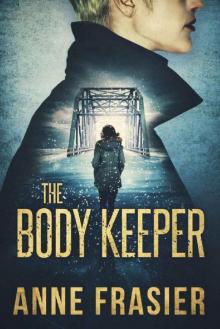 The Body Keeper
The Body Keeper Hush
Hush Play Dead
Play Dead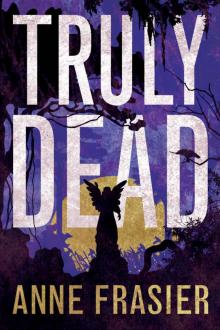 Truly Dead
Truly Dead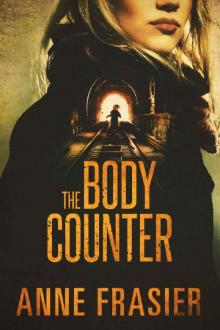 The Body Counter
The Body Counter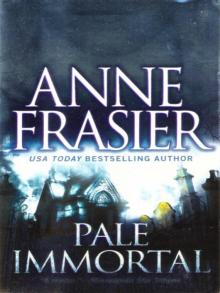 Pale Immortal
Pale Immortal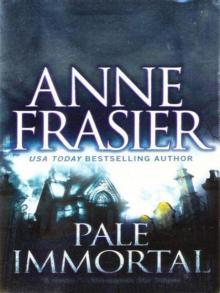 (2006) Pale Immortal
(2006) Pale Immortal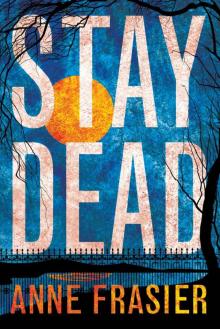 Stay Dead (Elise Sandburg series)
Stay Dead (Elise Sandburg series) Sleep Tight
Sleep Tight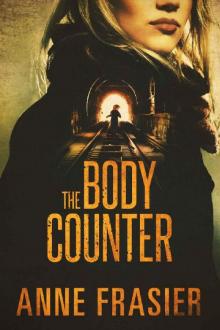 The Body Counter (Detective Jude Fontaine Mysteries Book 2)
The Body Counter (Detective Jude Fontaine Mysteries Book 2)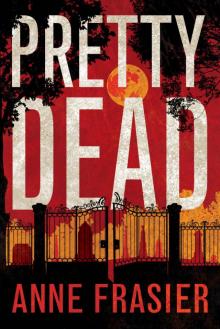 Pretty Dead
Pretty Dead Garden of Darkness
Garden of Darkness